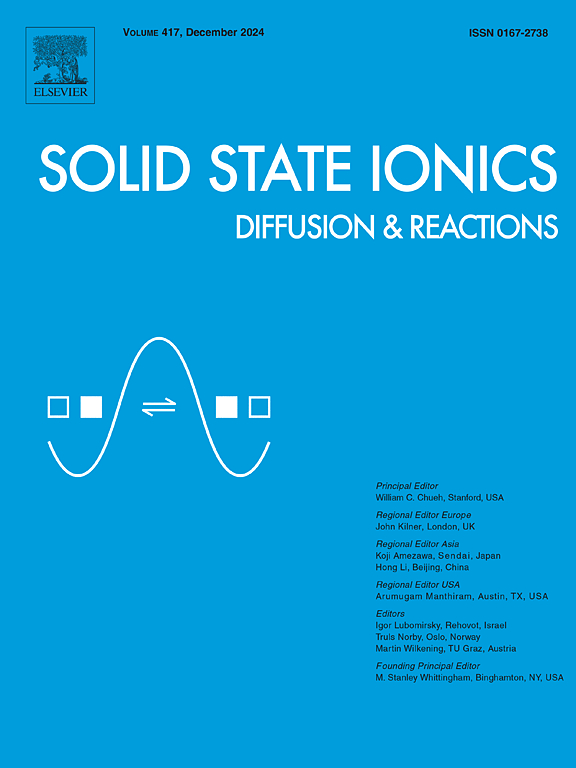下一代电池用富锂锰基氧化物材料的合成与电化学性能研究
IF 3.3
4区 材料科学
Q3 CHEMISTRY, PHYSICAL
引用次数: 0
摘要
富锂锰基氧化物材料(LROs)由于其高容量和低成本的特点,在下一代锂离子电池中得到了广泛的研究。然而,挑战仍然存在,这些挑战对实现可扩展的制造吞吐量构成了重大障碍,特别是工业规模的制造方法。本文以Ni0.1625Co0.1625Mn0.6750CO3碳酸盐为前驱体,研究了烧结温度、锂过渡金属摩尔比(Li/TM)和烧结时间等合成条件,以优化电化学性能。结果表明,烧结温度和Li/TM比对材料的电化学性能有显著影响。在Li/TM为1.35的条件下,分别在350℃、600℃和900℃条件下退火2 h的LROs粉末获得了优异的电化学性能:在25 mA·g−1条件下首次放电容量为287.12 mAh·g−1,库仑效率为82.13%,在250 mA·g−1条件下200次循环后仍保持91.28%的容量。此外,本研究阐明了烧结温度、Li/TM比和烧结时间对LROs的粒度、形貌和相组成等关键性能的影响,从而为规模化生产提供了坚实的参考。本文章由计算机程序翻译,如有差异,请以英文原文为准。
Synthesis and electrochemical performances of lithium-rich manganese-based oxides materials for next-generation batteries
Lithium-rich manganese-based oxides materials (LROs) have been extensively studied for next-generation lithium-ion batteries owing to their high capacity and low cost. However, challenges remain in addressing which pose significant barriers to achieving scalable manufacturing throughput, especially industrial-scale fabrication methodology. Herein, we explore the synthetic conditions including sintering temperature, lithium transition metal molar ratios (Li/TM) and sintering duration time to optimize electrochemical performances by using the Ni0.1625Co0.1625![]() Mn0.6750CO3 carbonate precursor. Results demonstrate that electrochemical performances are significantly affected by sintering temperatures and Li/TM ratios. LROs powders annealed at 350 °C for 2 h, 600 °C for 15 h and 900 °C for 2 h step by step under a Li/TM ratio of 1.35 achieved exceptional electrochemical performance: first discharge capacity of 287.12 mAh·g−1 at 25 mA·g−1 with a coulombic efficiency of 82.13 %, and retains 91.28 % of its capacity after 200 cycles at 250 mA·g−1. Moreover, this study elucidates the influence of sintering temperature, Li/TM ratios, and sintering duration time on the critical properties of LROs, including particle size, morphology, and phase composition, thereby offering a solid reference for scalable production.
Mn0.6750CO3 carbonate precursor. Results demonstrate that electrochemical performances are significantly affected by sintering temperatures and Li/TM ratios. LROs powders annealed at 350 °C for 2 h, 600 °C for 15 h and 900 °C for 2 h step by step under a Li/TM ratio of 1.35 achieved exceptional electrochemical performance: first discharge capacity of 287.12 mAh·g−1 at 25 mA·g−1 with a coulombic efficiency of 82.13 %, and retains 91.28 % of its capacity after 200 cycles at 250 mA·g−1. Moreover, this study elucidates the influence of sintering temperature, Li/TM ratios, and sintering duration time on the critical properties of LROs, including particle size, morphology, and phase composition, thereby offering a solid reference for scalable production.
求助全文
通过发布文献求助,成功后即可免费获取论文全文。
去求助
来源期刊

Solid State Ionics
物理-物理:凝聚态物理
CiteScore
6.10
自引率
3.10%
发文量
152
审稿时长
58 days
期刊介绍:
This interdisciplinary journal is devoted to the physics, chemistry and materials science of diffusion, mass transport, and reactivity of solids. The major part of each issue is devoted to articles on:
(i) physics and chemistry of defects in solids;
(ii) reactions in and on solids, e.g. intercalation, corrosion, oxidation, sintering;
(iii) ion transport measurements, mechanisms and theory;
(iv) solid state electrochemistry;
(v) ionically-electronically mixed conducting solids.
Related technological applications are also included, provided their characteristics are interpreted in terms of the basic solid state properties.
Review papers and relevant symposium proceedings are welcome.
 求助内容:
求助内容: 应助结果提醒方式:
应助结果提醒方式:


